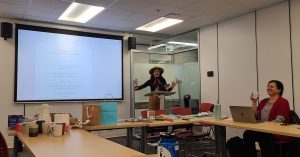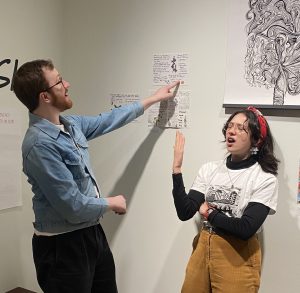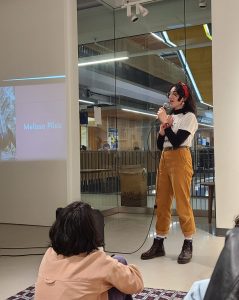


EDGES member Melissa Plisic has successfully completed their MA degree from UBC’s Institute for Gender, Race, Sexuality and Social Justice. Congrats, Melissa! Their master’s thesis is titled “’Plant-Based Research: a queer master’s thesis born of mass extinction“.
Master’s Thesis Abstract:
Plant-Based Research concerns kinship-making practices in the context of mass extinction. This research is grounded in queer ecologies and critical animal studies, while aligning with the tenets of feminism, decolonization, critical disability studies, and critical environmental justice. The problem it undertakes is the ways in which settler colonial, cis-heteropatriarchal, white supremacist and anthropocentric approaches to building relationships, or making kin, are fostering mass extinction and climate change. The methodological fuel for this research is multispecies autoethnography, as described by Kathryn Gillespie. Despite auto-ethnography’s egotistical tendencies, “multispecies autoethnography, like humanist autoethnography, is by nature a relational methodology; it signals a focus on the self, but in its multispecies naming necessitates attention to the self in relation to another (or multiple other) species” (Gillespie 3). The “participants” of this research are considered as coconspirators. To co-conspire against something means to work together against it, “it” in this case being white speciesist capitalist cis-heteropatriarchal settler colonialism. “Coconspirator” encapsulates the agencies of multispecies kin, including plants, who communicate by means other than language or sounds (Lawrence 1). The root word “conspire” shares a postal code with “respire”, meaning to breathe; respiration is what connects plants and animals (including humans). We are coconspirators and corespirators. Plant-Based Research is an attempt to unhinge from science-based climate change engagements through its devotion to artistic praxis and attunement to place. The chapters contained in this thesis are a collection of poetry, a zine, a stand-up comedy transcript, a playlist, and more traditional academic prose. This multi-modal, arts-based, and place-based thesis engages the themes of aging and death, plants and gardening, veganism, dogs, disability, astrology, restitution, harm and care, home, friendship, and love. While being generally inconclusive, this thesis invites its readers to critically reflect on the ways in which they make kin, and how they might practice kinship in ways that are antithetical to settler colonial, cis-heteropatriarchal, white supremacist, and anthropocentric modes of being in relationships.